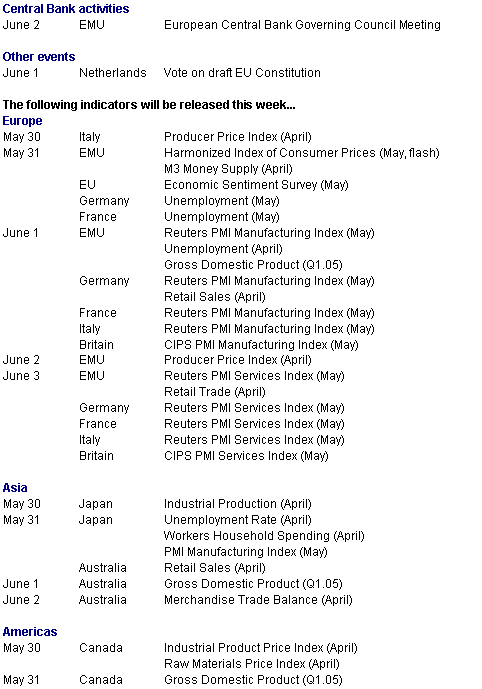Monday, May 30, 2005

Stocks steady in May
With two days of trading left in May for most equities (the exceptions being U.S. and British stocks - both markets are closed on Monday for holidays) most indexes performed better last week with the exception of the STI and Hang Seng. Most have managed to be up on the month. Unlike the euro, the expected 'Non' in France and 'Nee' in the Netherlands did not seem to depress stocks. Rather, both the DAX and CAC at best were up on the week.

Bank of Canada keeps 2.5 percent interest rate
As expected, the Bank of Canada kept its target interest rate unchanged at 2.5 percent as a higher Canadian dollar put a break on economic growth. The Bank repeated a pledge to raise rates when production rebounds. The Bank's interest rate has been unchanged since October 2004. In its statement, the Bank said that growth this year and next is still expected to come mostly from domestic demand, and it said a reduction in monetary stimulus will be required over time. The Bank of Canada cut its 2005 economic growth forecast to 2.6 percent last month from 2.8 percent, citing its rising currency that has resulted in increased imports and slowed export growth. Exports make up 40 percent of Canada's C$1.1 trillion ($870 billion) economy, the largest share in the Group of Seven industrialized nations. The Canadian dollar (loonie) weakened at the prospect of a wider gap between U.S. interest rates and those in Canada as the Federal Reserve continues to push the Fed funds rate (now 3 percent) higher. A weakening loonie combined with better than initially reported U.S. GDP growth is a positive for equities and the Canadian economy.

Global Stock Market Recap

Europe and Britain
The falling euro benefited exporters' stocks last week especially after U.S. gross domestic product grew faster than first estimated. The higher growth figure in Europe's largest export market might offset some investor concern about faltering demand in European economies. Reports last week showed slower expansion of the U.K. economy and decreasing business confidence in Germany and Italy. Oil prices continued to toy with equity investors. After climbing above $51 a barrel early in the week, prices eased below that level during European trading hours, dragging oil company stocks down with it. However, technology stocks were encouraged by the Nasdaq climbing towards three-month highs. Stocks in France and Germany were also pressured downward Friday on the prospects of France's no vote in Sunday's EU constitutional referendum.

The FTSE poked its head over the 5000 mark for the first time in two months on Thursday, but was not able to stay there after a brief attempt to push beyond that barrier ran out of momentum. Merger news along with a plethora of economic data kept traders on their toes Thursday, which the last working day before the extended bank holiday weekend was notable for the absence of tradable news.
Asia/Pacific
Asian/Pacific stocks ended last week on a positive note after the U.S. GDP report showed the U.S. economy grew faster than initially estimated without driving up prices. Exporters benefited from the news. However, despite Friday's gains, the STI and Hang Seng were unable to recoup losses from earlier in the week. Japanese stocks were boosted by a positive retail sales report what was up more than the consensus forecast. Investors were also optimistic about the prospects of a positive industrial production report due on Monday (Sunday night on the U.S. east coast).

On Wednesday, however, stocks responded to climbing oil prices and were down - especially those of exporters such as Toyota Motor and Samsung Electronics. Investors, once again seeing $50-plus oil, are worried that higher oil prices could stunt global growth and dampen consumer spending.
Japan's 11 major banks, including Mitsubishi Tokyo Financial Group and Mizuho Financial Group, have cut bad loan ratios to end a festering crisis that threatened the banking sector, according to Tatsuya Ito, head of the Financial Services Agency. The bad loan ratio at the country's 11 biggest banking groups declined to 2.93 percent for the fiscal year ended March 31st, down from 5.18 percent a year earlier. Earnings growth at Japan's banks hinges on their ability to sell more products to individuals and cut a reliance on lending, which has not grown in nine years.
Currencies
The euro wobbled and dropped last week on a combination of dismal economic data and on the projected no votes from France and the Netherlands in the next few days. However, on Friday - prior to the long weekends in both U.S. and Britain, the euro managed to regain its footing and end the week almost unchanged. Some analysts compared the vote on the constitution with the earlier mess about the stability pact. It increases the impression of an EU that is muddled and confused and has underlying political uncertainty. This undermines the single currency.

Both the two main German economic surveys - ZEW and Ifo - were down while the Organization for Economic Cooperation and Development (OECD) cut its 2005 German growth forecast to 1 percent from 1.2 percent, and that for 2006 to 1.6 percent from 2.1 percent. For the whole EMU, growth was revised downward to 1.2 percent and 2.0 percent respectively for 2005 and 2006.
The dollar has gained 9.3 percent against the euro so far this year as the pace of expansion outstrips that of the eurozone. The Federal Reserve's eight interest-rate increases since June are also boosting demand for dollar-denominated debt. The European Central bank has left its benchmark rate unchanged at 2 percent since June 2003.
A note on bonds
For the first time in over 40 years, Britain sold £2.5 billion of 50-year bonds on Thursday. This follows a similar - and very successful - sale by France a few months ago. The move came in part because of historically low interest rates, which help lower the government's cost of borrowing. At the same time, there is a rising demand from investors, particularly pension funds and insurers who are seeking assets that can better match their ever-lengthening liabilities. The U.S. is expected to reintroduce 30-year bonds - probably in February 2006.
Indicator scoreboard
EMU - March seasonally adjusted industrial orders dropped 0.5 percent and were down 0.7 percent when compared with last year. Machinery equipment orders plummeted 4.2 percent while textile orders sank 4.1 percent and metal product orders dropped 2.1 percent.
March unadjusted merchandise trade surplus increased to €4.2 billion from €3.6 billion in February. Unadjusted exports were flat on the year but imports were up 7 percent. But on a seasonally adjusted basis, the surplus was €4.4 billion, down from €5.3 billion in the previous month. Seasonally adjusted exports were flat on the month while imports were up 1 percent.

Germany - First quarter gross domestic product was up 1 percent and 1.1 percent when compared with last year. Domestic demand was down 0.6 percent with private consumption slipping 0.2 percent. Gross fixed capital investment sank 1.7 percent. Gains for equipment and other investment categories (both up 0.9 percent) were more than offset by a plunge in construction investment of 3.9 percent.

May ZEW sentiment on the German economic outlook among financial exports dropped to 13.9 from 20.1 in April. The survey is prepared by the Mannheim-based Center for European Economic Research (ZEW). The decline in sentiment was due to concerns about a slowing of the world economy this year. However, the panel was slightly less pessimistic about current economic conditions. The ZEW surveyed 298 German financial experts for their opinions on current economic conditions and the economic outlook for major industrial economies between May 2nd and May 23rd.

March seasonally adjusted industrial production (excluding construction) was revised to an increase of 0.4 percent from the originally reported decline of 0.2 percent. Manufacturing output was revised up slightly - from an increase of 0.3 percent to plus 0.4 percent. Construction output was revised to a drop of 12.4 percent from the originally reported decline of 10.8 percent.

May Ifo business sentiment index was down for the fourth month. The index reading fell to 92.9 from 93.3 in the previous month. Future expectations declined to 92.3 from 93.6 in April while current conditions were up slightly to 93.4 from 93.1 in the prior month. Sentiment in the manufacturing, construction and wholesale sectors was down while retail sentiment was up.

France - April consumer spending on manufactured goods was up 1 percent and 2.8 percent when compared with last year. All major categories were up on the month with the exception of textiles.

April producer price index was up 0.2 percent and 3.1 percent when compared with last year. The PPI excluding food and energy was up 0.1 percent and 2.4 percent on the year. Fuel prices were up 2.7 percent after soaring 6 percent in the previous month.

Italy - March seasonally adjusted retail sales were up 0.2 percent and 0.1 percent when compared with last year. On an unadjusted basis, sales were up 2.2 percent on the year. Unadjusted food sales were up 4 percent thanks to Easter while non-food sales were up 0.7 percent on the year. Food accounts for about 40 percent of the index. Retail sales data are not watched closely because they show little correlation with consumer spending data as published in quarterly GDP statistics.

Britain - First quarter gross domestic product was up 0.5 percent and 2.7 percent when compared with last year. Household spending was up 0.3 percent and 2 percent on the year. Government final consumption expenditure rose by 0.7 percent and is now 3.4 percent above the level seen a year ago. Exports were down 1 percent over the quarter with goods exports down 1.5 percent and services exports up by 0.2 percent. Imports dropped 1.9 percent as goods imports were down by 2.7 percent but services imports were up by 0.9 percent.

Asia
Japan - March seasonally adjusted tertiary index sank 1 percent but was up 2.2 percent when compared with last year. The wholesale and retail components sank 2.9 percent - they account for 25 percent of the index. Information and communication dropped 1.8 percent. The tertiary index reflects activity in 11 service industries, among which are utilities; transport; telecommunications; wholesale and retail; finance and insurance; real estate; restaurants and hotels; medical, health care and welfare.
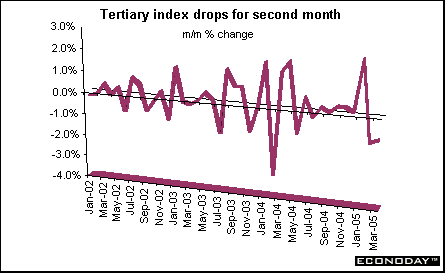
March all-industry index dropped 0.5 percent and rose 2 percent from a year earlier. The all industry index takes a reading of activity in the 11 industries that comprise the tertiary index combined with activity in the construction, agricultural and fisheries industries, the public sector and industrial output. This index is considered a close approximation for gross domestic product growth as measured by industrial and service sector output.
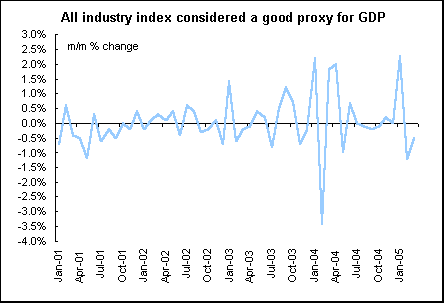
April seasonally adjusted merchandise trade surplus declined to ¥712.2 billion from ¥ 895.7 billion in March. Exports were up 1.1 percent while imports jumped 5.6 percent. On the year, exports were up 7 percent while imports soared 16.1 percent.
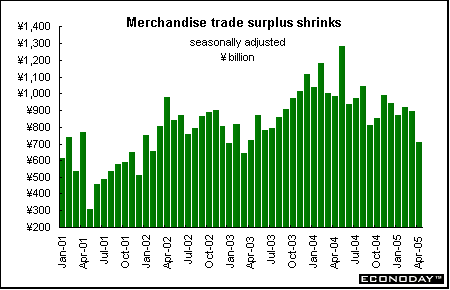
May Tokyo consumer prices were up 0.3 percent but dropped 0.2 percent when compared with last year. Core Tokyo CPI which excludes fresh food was up 0.2 percent and down 0.4 percent on the year. April nationwide CPI was up 0.2 percent and unchanged on the year. Core CPI was up 0.3 percent but down 0.2 percent from a year earlier. Deflation is now in its eighth year. Reductions in telephone and electricity fees pushed prices lower.
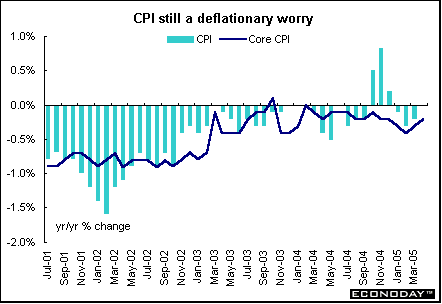
Bottom line
This week promises to be a landmark week - votes on the EU in France and the Netherlands - plus an ECB meeting. The referendum results will be carefully studied as will the Bank's response. While equities seemed unaffected by the negative sentiment towards the EU constitution and in fact were up on the week, the euro wasn't that fortunate. It took a beating in intra-week trading even though it ended on Friday not far from where it started on Monday. Polls in France and the Netherlands are predicting that the referendums in both countries will be voted down. The markets undoubtedly will look with disfavor on the fissures between EMU countries and the uncertainty that causes. The euro has not cured all economic ills - no surprise - and many analysts are viewing the projected negative French and Dutch votes as a vote against their respective governments rather than the constitution per se.
Austria and Germany became the eighth and ninth countries to ratify the European Union constitution treaty, with both legislatures voting overwhelmingly in favor. Greece, Hungary, Italy, Lithuania, Slovenia, Belgium and Slovakia had already backed the constitution in votes in their national parliaments. Spain was the first country to hold a referendum, with 77 percent voting in favor in February. All 25 members must ratify the proposed constitution for it to become law. Popular votes are also expected to take place in the Czech Republic, Denmark, Ireland, Luxembourg, Portugal and Poland.
All eyes have been fixed on Sunday's referendum in France and downplaying to some extent, the importance of the same vote in the Netherlands on Wednesday. The Dutch are the largest per head net contributor to the EU and are even more likely to vote No than the French. Their economy is weak, the euro is seen as inflationary, and immigration attitudes have hardened. While the markets may have discounted the probability of a French no, a French yes and a large Dutch no could be the worst of all possible worlds for the euro since this would imply a sustained period of uncertainty. Nevertheless, whether or not the French or Dutch vote no, almost everyone believes the EU should be able to cobble together some sort of alternative status quo.
Looking Ahead: May 30 through June 3, 2005
